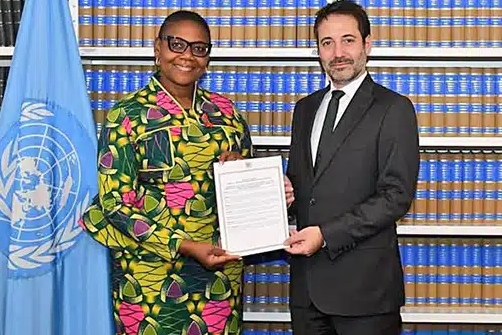Recent Death Penalty Abolition Victories at the UN (Updated)
 Photo from Zambian Foreign Ministry showcasing the delivery of the "instrument of accession" to the UN.
Photo from Zambian Foreign Ministry showcasing the delivery of the "instrument of accession" to the UN.
Update (1/15/2024): Zambia has ratified OP2! Zambia abolished the death penalty in December 2022, right before its Universal Periodic Review in January 2023. As part of the most recent UPR, Zambia accepted recommendations to ratify the Second Optional Protocol to the International Covenant on Civil and Political Rights, aiming at the abolition of the death penalty (OP2). But recently, on December 19, 2024, Zambia acceded to the protocol, just two days after Zambia voted for the first time in favor of the General Assembly resolution calling for a moratorium on the death penalty. OP2 is important because it formalizes and "locks in" a country's abolition of the death penalty, as the protocol has no "exit mechanism." 92 UN Member States are parties to OP2, so OP2 is frequently part of The Advocates' advocacy agenda for countries that have abolished the death penalty but have not taken that final step.
The Advocates has achieved some significant victories in the abolition of the death penalty internationally recently, especially when it comes to the Universal Periodic Review. The UPR is a unique mechanism of the Human Rights Council that calls for each UN Member State to undergo a peer review of its human rights record every 5 years and provides a platform for other countries to offer the State recommendations on ways to improve before its next review.
The Advocates routinely submit UPR reports highlighting the use of the death penalty in countries coming up for review, with a goal of improving the recommendations that country receives as a way to turn up the heat and move toward abolition. Strategic recommendations that better target a country’s death penalty situation are more likely to be accepted and therefore more likely to be implemented.
In 2024, the number of death penalty recommendations made during the UPR increased compared to the previous cycle in 2019 for several countries for which The Advocates submitted reports: Brunei (14 to 16), North Korea (17 to 22), Ethiopia (13 to 21), and Qatar (10 to 23). Given that each country making recommendations has about 60 seconds to speak, increasing mentions of the death penalty is a significant achievement.
The Advocates has also achieved some qualitative wins within the UPR. Togo recommended that Ethiopia commute death sentences, and Lithuania suggested that Qatar promote public discussion on a death penalty moratorium. North Korea quickly rejected 5 death penalty recommendations but postponed decisions on others, including to reduce the number of crimes eligible for the death penalty and to limit it to the 'most serious’ crimes. These smaller recommendations could lead to potential progress, and the fact that North Korea is taking some time to “think about” them—rather than rejecting them outright—provides a glimmer of hope.
In its 2019 UPR, Equatorial Guinea accepted a litany of recommendations to abolish the death, which it finally did in September of 2022. During the 2024 UPR, 26 countries took the time during their statements to congratulate Equatorial Guinea on abolishing the death penalty, including Ghana and Sierra Leone, countries that abolished the death penalty themselves within only the last two years. Amy Bergquist, Associate Program Director in the International Justice Program, was especially thrilled: “I like to think of what we're doing as building a community of abolitionist nations that celebrates each new country joining the group.”
Just this week, the UN General Assembly adopted the biannual resolution calling for a global moratorium on the death penalty with a record-setting vote of 130 in favor, 32 against, and 22 abstentions! The previous record (from 2022) was 125 votes in favor. The coalition of abolitionist countries continues to grow, now encompassing 2/3rds of UN member states.
Learn more about The Advocates work on the death penalty here, and stay up to date with our publications here.



